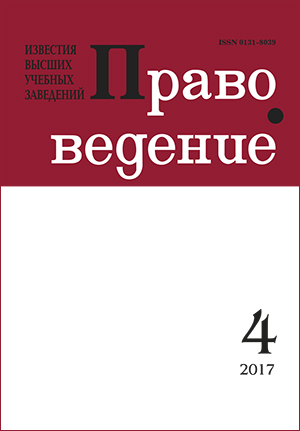Indian penal code of 1860: the history of creation and special features
Abstract
The article considers the history of colonial criminal law system of the British India at the end of the 18th and 19th century. The authors investigate the role of the Law Commission at the governor general and a personal contribution of its chairperson T. B. Macaulay during the criminal law codification in India. This article analyses the sources and structure of the Indian Penal Code of 1860, its doctrinal and practical value up to the present day. The Indian law was polysystemic and included two personal and religious systems: Hindu and Islamic law. The official law codification in India became possible at the governor general William Bentinck. His legal adviser T. B. Macaulay was drafting the Indian Penal Code during the period from 1835 to 1837. Its content was influenced by Bentinck’s tough criminal policy connected with counteraction to ritual crime — to the groups of thugs (robbers stranglers) and Satie’s practice (self-immolation of widows). Members of the Law Commission were under strong influence of the utilitarian philosophy of Jeremy Bentham, supporter of the “universal codification of law”. The project was influenced by the “Livingston Code” of 1826 in Louisiana where there was a consistent humanization of punishments: abolition of the death penalty, delimitation of norms of criminal law and criminal procedure, separation of the “general part” in the Codes’ structure. Systematization of the colonial law of India was complex and interdisciplinary, it contained both codification and consolidation elements. Success of the IPC was connected with the reformers’ systematic approach who have in parallel developed such basic codes as the Civil Procedure Code of 1859, the Criminal Procedure Code of 1861, the consolidated Act on Police of 1861 and Act of Proofs of 1872, etc. The good utilitarian reasons were the cornerstone of the large-scale interdisciplinary systematization and unification of the Indian law. Primarily, it was the need to provide a reliable management and legal order within the extensive territory of unstable Indian presidencies.
Keywords:
codification of law, law reform, colonial legislation, criminal (penal) code, Hindu law, Islamic law, sources of law
Downloads
References
Downloads
Published
How to Cite
Issue
Section
License
Articles of "Pravovedenie" are open access distributed under the terms of the License Agreement with Saint Petersburg State University, which permits to the authors unrestricted distribution and self-archiving free of charge.




